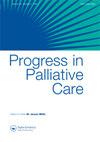Evaluating the relationships between multiple symptoms; altered nutritional status, and their effects on the quality of life of patients diagnosed with cancer in Palestine: an explorative study
IF 0.9
Q4 PUBLIC, ENVIRONMENTAL & OCCUPATIONAL HEALTH
引用次数: 0
Abstract
Background Cancer is the second most fatal disease in the world, following cardiac diseases. Throughout the cancer trajectory, patients experience symptom clusters and malnutrition. Both affect the quality of life for these patients. Limited studies had focused on these issues in Palestine. Purpose This study aims to assess and evaluate the relationships between multiple symptoms, altered nutritional status, and their effects on the quality of life of patients diagnosed with cancer in Palestine. Methods An explorative cross-sectional study was conducted to collect data from 120 patients with cancer. Results Fatigue, dry mouth, and pain were the most prevalent symptoms experienced by participants with mean scores of 5.5, 4.9, and 4.5 respectively. For the quality of life, general activity and work were the worst variables experienced by patients. More than half of the patients were malnourished (53%). Nutritional status was significantly correlated and predicted most of the symptoms and quality of life dimensions (P < 0.05). Conclusion The current study highlighted the importance of symptom clusters in cancer, quality of life, and nutritional status. It also focused on nutritional status as an essential factor and critical predictor that may affect and correlate with the worst symptom clusters and low quality of life. Implication Symptom clusters and malnutrition predict the poor quality of life among Palestinian oncology patients. Therefore, symptom clusters and nutritional status should be taken into consideration at an earlier stage in the nursing care plan, and in the oncology assessment guidelines in Palestine.评估多种症状之间的关系;营养状况的改变及其对巴勒斯坦癌症患者生活质量的影响:一项探索性研究
癌症是世界上第二大致命疾病,仅次于心脏病。在整个癌症发展过程中,患者会经历症状聚集和营养不良。两者都会影响这些患者的生活质量。有限的研究集中在巴勒斯坦的这些问题上。目的本研究旨在评估巴勒斯坦癌症患者多种症状、营养状况改变及其对生活质量的影响之间的关系。方法采用探索性横断面研究方法,收集120例肿瘤患者资料。结果疲劳、口干和疼痛是参与者最常见的症状,平均得分分别为5.5、4.9和4.5。对于生活质量,一般活动和工作是患者经历的最差变量。超过一半的患者营养不良(53%)。营养状况与大部分症状及生活质量维度存在显著相关性(P < 0.05)。结论目前的研究强调了症状群在癌症、生活质量和营养状况中的重要性。它还侧重于营养状况作为一个重要因素和关键预测因素,可能影响和关联最坏的症状群和低生活质量。意义症状群和营养不良预示巴勒斯坦肿瘤患者生活质量差。因此,症状群和营养状况应在护理计划的早期阶段加以考虑,并在巴勒斯坦的肿瘤评估指南。
本文章由计算机程序翻译,如有差异,请以英文原文为准。
求助全文
约1分钟内获得全文
求助全文
来源期刊

PROGRESS IN PALLIATIVE CARE
PUBLIC, ENVIRONMENTAL & OCCUPATIONAL HEALTH-
CiteScore
2.60
自引率
11.80%
发文量
24
期刊介绍:
Progress in Palliative Care is a peer reviewed, multidisciplinary journal with an international perspective. It provides a central point of reference for all members of the palliative care community: medical consultants, nurses, hospital support teams, home care teams, hospice directors and administrators, pain centre staff, social workers, chaplains, counsellors, information staff, paramedical staff and self-help groups. The emphasis of the journal is on the rapid exchange of information amongst those working in palliative care. Progress in Palliative Care embraces all aspects of the management of the problems of end-stage disease.
 求助内容:
求助内容: 应助结果提醒方式:
应助结果提醒方式:


